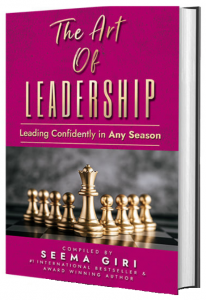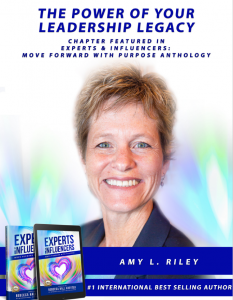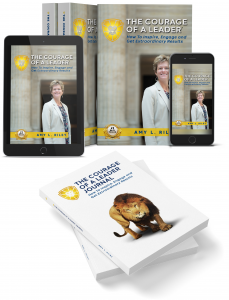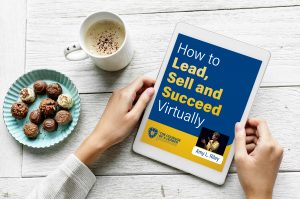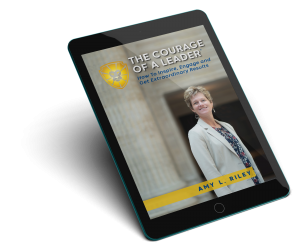You heard from Elisabeth Herbner in the last episode, as she shared some of the wisdom she’s gotten from previous guests on The Courage of a Leader podcast. That was a nice way to underscore pragmatic, universal and extremely valuable insights and guidance we’ve heard.
In this episode, Elisabeth shares guidance from her yoga practice, and the real-life examples of how she and others have put it into play to best serve themselves.
Play along, and as you listen, identify what’s most important for you to practice at work and in your life, and identify how to do so.
Practice your own wisdom for improved satisfaction and results!
About the Guest:
Elisabeth Herbner has been helping people reach their goals since studying health and wellness in college. She owns a small business teaching yoga where she is fulfilling her purpose of bringing peace, light and love into the world. Elisabeth has worked with a wide variety of clients from professional athletes to librarians. In 2014, she actively chose to step down from people leadership and full time fitness to start working in health care. Over her multiple careers, she has found her favorite role is support and cheerleader, which she learned from her biggest fan, her mom.
About the Host:
Amy L. Riley is an internationally renowned speaker, author and consultant. She has over 2 decades of experience developing leaders at all levels. Her clients include Cisco Systems, Deloitte and Barclays.
As a trusted leadership coach and consultant, Amy has worked with hundreds of leaders one-on-one, and thousands more as part of a group, to fully step into their leadership, create amazing teams and achieve extraordinary results.
Amy’s most popular keynote speeches are:
The Courage of a Leader: The Power of a Leadership Legacy
The Courage of a Leader: Create a Competitive Advantage with Sustainable, Results-Producing Cross-System Collaboration
The Courage of a Leader: Accelerate Trust with Your Team, Customers and Community
The Courage of a Leader: How to Build a Happy and Successful Hybrid Team
Her new book is a #1 international best-seller and is entitled, The Courage of a Leader: How to Inspire, Engage and Get Extraordinary Results.
https://www.linkedin.com/in/amyshoopriley/
Link mentioned in the podcast
The Inspire Your Team assessment (the courage assessment): https://www.courageofaleader.com/inspireyourteam/
Thanks for listening!
Thanks so much for listening to The Courage of a Leader podcast! If you got inspired and/or got valuable leadership techniques you can use from this episode and think that others could benefit from listening, please share using the social media buttons on this page.
Do you have questions or feedback about this episode? Leave a comment in the section below!
Subscribe to the podcast
If you would like to get automatic updates of new The Courage of a Leader podcast episodes, you can subscribe to the podcast on Apple Podcasts. You can also subscribe in your favorite podcast app.
Leave us an Apple Podcasts review
Ratings and reviews from our listeners are extremely valuable to us and greatly appreciated. They help our podcast rank higher on Apple Podcasts, which helps us ignite The Courage of a Leader in more leaders! Please take a minute and leave an honest review on Apple Podcasts.
Teaser for next episode
Tune in next for unique perspectives and pragmatic advice for How to Go From Visionary to Change Agent to Triumphant with David Johnson. You’ll appreciate the way he approaches business turnaround efforts!
Transcript
Have you heard from Elisabeth Herbner, in the last episode, as she shared some of the wisdom she's gotten from previous guests on the courage of a leader podcast, that was a really nice way to underscore pragmatic, universal and extremely valuable insights and guidance we've heard. In this episode, Elizabeth shares guidance from her yoga practice and the real life examples of how she and others put it into practice, to best serve themselves, and those around them. Play along, and as you listen, identify what's most important for you to practice in your life, and identify how to do so. Practice your own wisdom for improved satisfaction and results for you, and your team and the work that you do.
Amy Riley:Welcome to the Courage of a Leader podcast. This is where you hear real life stories of top leaders achieving extraordinary results. And you get practical advice and techniques, you can immediately apply for your own success. This is where you will get inspired. And take bold, courageous action. I'm so glad you can join us. I'm your host, Amy Riley. Now, are you ready to step into the full power of your leadership and achieve the results you care about most? Let's ignite the courage of a leader.
Amy Riley:I am delighted to be here today with Elisabeth, who I'm super honored is a regular consistent listener of the courage of a leader podcast that absolutely delights me. So I think of Elisabeth as number one listener. And Elisabeth, you know, that's something I've admired about you for a long time. I think it's super inspiring. And an amazing life skill is that you are able to tune into yourself to see what you need, and tune out to the world and find the resources that will best support you help you get where you're going support you in a moment.
Elisabeth Herbner:Let's just dive right in and get started on the top 10s And how I how I came to these. Okay, okay. So I was prepping for the podcast. And I, I had this idea and this vision of what I want to talk about. And I'm finalizing things yesterday, I think I've got a great handle on it. And I have my aha moment of like, yoga is such a big part of this. Let's take that first practice of the yamas and niyamas of yoga. And I know that sounds kind of woowoo people think of yoga as being like, Oh, I'm going to yoga class, I'm doing the physical poses in the asana practice. And that's, that's one part of eight other parts of yoga. So the the yamas and niyamas are like the first the foundation of the actual practice of yoga. So the first five things are the yamas and may are kind of like our, our social norms, like our outer world behaviors that we practice, and we're going to walk through those and I'll tell you how they relate to creating that space. The second five are the Niyamas or something that you and I are very familiar with as those inner world personal practices. Okay. I just thought this was a beautiful way to incorporate my yoga journey with your podcast listeners and your leaders who may you know, take a little something from from my guest appearance.
Amy Riley:I'm I'm curious. I'm ready.
Elisabeth Herbner:Okay, so number one we call a ahimsa. That's non violence. So that's why a lot of Yogi's are vegan, vegetarian, okay, but it also as you and I have done our work together, I like to call it utilizing balance to allow ourselves and others grace as we maneuver the ebbs and flows of life. So like you always you always had, you know, don't do the double whammy where you feel bad about feeling bad. This is that practice of like, be nice to yourself. Be nice to the gentlemen that are taking up the track. You know, be nice to your kindergarten teacher who pointed out your efficiency.
Amy Riley:Not not the assignment, Amy? Yes. Okay. I love I love that. And it's the the non violence is the compassion out to others.
Elisabeth Herbner:ourselves. Yes. Because compassion is not complete if it does not include yourself. Hmm,
Unknown:well said.
Elisabeth Herbner:The second one we call Satya or truthfulness. Okay, this one for me is like, what really resonates with you and your podcast is that authenticity, you know that that's huge for me. And so that's what I kind of put for the truthfulness is like, you know, when you're in the flow, your physical body, your mental capacities, those are all connected with you living as your like highest self. I know when I go to the grocery store that if I buy Pop Tarts, that's definitely not serving my highest self. And I'm going to practice some compassion that I don't eat them all the time. Mm hmm. This is a treat. Yeah. Yes. So that's the authentic part, like, knowing that, yeah, like carrots are going to be healthier than eating this candy corn. But, you know, you're just going to kind of accept it and move along. Or, you know, when you feel bad, like, I had a very uncomfortable work situation, as you know, a while ago, and in two different work scenarios, and, and it was hard and it was uncomfortable, but there wasn't a different way for me to go about it because of how I needed to be in that situation. So like, that's the kind of like, you can go you rest your head on the pillar, you can look yourself in the mirror and know that you did what you needed to do. That authenticity of that behavior. So yeah,
Amy Riley:okay, to seal this. I'm also hearing like a true to your own values, and what's important to you, okay, great.
Elisabeth Herbner:Because I, you know, I always tell people, I lost a job, and I would rather lose a job and be true to myself, than have stayed at a place that there was an authentic feeling.
Amy Riley:Yeah, that's misalignment? Yes, yes, yes. Yeah. Yeah.
Elisabeth Herbner:Moving along our third, Yama is a stadia or non stealing. So I like to round us as be here. Now, you know, that presence, that practice of presence, you don't want to, you know, be thinking about balancing your checkbook or your client meeting that you had earlier, you know, so just that, that practicing presence, and that's, again, what helps create that space that you need. And so it's that and that's it. We call it practice. It's not yoga, perfect. It's yoga practice. All of these things are something we practice. You know, that's, that's why I love yoga and the practice of yoga is because I'm, I'm going to learn it until the day I die. And I will never even have covered just this smallest piece of it. Mm hmm. I love that. Practice. You were you were present with yourself on your run. You were like, I'm having a great run. You know, you weren't you, you know, you got a little distracted with those gentlemen. But then you came back. I'm having a great run. I'm gonna focus on that. You were practicing presidents? Mm hmm. The power of that? Yes. And number four Brahmacharya? So, yeah. It's good. Mostly non excess. So like not eating the whole box of Pop Tarts. And a lot of times in yoga, this is it coincides with celibacy. So not being excessive in certain aspects of your life. I like to just call it though, again, that practicing balance in all areas of your life. So like, you tend to go in seasons of your life like or training seasons, you know, and we and we have different you know, like, you and I are in midlife, I'm going to say, and that's a busy time for people. Yeah, that's okay. So like, if you feel like you're busy, it's, you know, because you're, you're bringing up your children, but you're also taking care of your elderly parents. And, you know, it's, it's just naturally a busy time because your career is at its highest, and you're at your prime, and it's just, you know, busy. And that's okay. Like, you know, when we're younger, we have less things to worry about, because that's our growing time, that's a more laid back time. And then when we're older, again, it gets a little slower. And that's okay, too. So just honoring the different seasons of your life and different balancing practices of, of working on your ultra marathon running universes. You know, now I want to I want to incorporate my family more into that plan. And, and balancing that balancing act.
Amy Riley:Beautiful Elizabeth, as it has me thinking about how it serves us to look at balance in a bigger picture, like sometimes a day, an hour a week even might not feel balanced in the different areas of our lives and the different roles that we choose to play. But how does that look over a larger period of time and or how are you intentionally choosing? I think I've said this to you before, when my dad was in the midst of pretty significant health issues. I know I had a week where I decided I'm going to beat him amazing daughter this week. Mom, why is not so much? Right. But I've got I've got a great partner. So I know my husband will handle the, you know, our home front. But my parents need me. Yes, we Yeah. Right. So the balance is shifting there. And it's intentional. And when we allow that to be a choice, like I said, and have any guilt that week, right, or weeks that looked like that, for a period of time. I knew it was a choice. Right. And it created some some space for it to be what it was.
Elisabeth Herbner:Yes, lovely. Yeah. So I've been apologizing to some of my friends because I prioritize spending time with dad. And I don't, I don't really feel bad about it.
Amy Riley:Yeah, yeah. And that's, and that's the choice for this period of time. Yeah. Yeah.
Elisabeth Herbner:That's a good, a good analogy to the non excess and then creating balance. Yeah, again, that big picture thought of, yeah, everything's temporary.
Amy Riley:Indeed, indeed.
Elisabeth Herbner:The number five, the fifth, Yama, the outer world behavior is Aparigraha or non possessiveness, non greed, which is really hard in our capitalist. We're inundated with images of everything and, you know, just advertisement and it's so it's the other the other thing I like to say is like, it's the non, it's really easy to when you're in yoga class, especially to like, look around and be like, oh, like, there's so much more flexible here. Well, if you're not really doing that pose correctly, did yoga with my friend when I was visiting her. Now we use the peloton app. And it was like I love doing yoga at home because I'm not distracted by all these people and other things like it's nice to, to just be in my home and not go anywhere and have that outer world distraction, I can just focus on me and what I need. So, Baron Baptiste, one of my favorite Yogi's has this phrase called try easy. And so I like to associate it with this non greed, non possessive likes. Try easy, like Yes. No. Yeah. You said on your next long run, trying easy
Amy Riley:try. Well, and I think that's what I chose. In that moment. I get well they chose ease.
Elisabeth Herbner:Pick your battles. Yeah.
Amy Riley:Okay. So Elisabeth, I had planned to ask you like, how do you do this? Like, right? Like, how do you do a good job of intentionally creating space and creating what you want in your life? How do you tune in and tune out to what's available? And I think you're answering this with your top 10 lists. So I'm gonna, I'm not going to have the yogi words, right. But I'm gonna review now the yamas and invite all of the listeners in this moment to look to like, what are the distinctions? What are the ways of thinking about what's going on in our lives in the moment that will help you tune into what is going to serve you? So number one, was the non violence that using bounce that using compassion with others and with ourselves? Number two, was the truthfulness, the authenticity, right? How what brings your highest self when and how are you in the flow, you're being true to your own values. Three was the Be here now practicing present. I love that rather than be present, practice presents, keep bringing your mind back. Right, that allows us to listen to ourselves and to others. Number four was the non excess having to balance in all areas having balance in the bigger picture, choosing what that balance looks like, in a moment? And five was non possessiveness. Try easy try not comparing. So easy, like, oh, they have that I knew that we need this gadget. You know, all the kids need Spotify. Everybody else has it. But yeah, intentional choosing not getting not getting caught up in. I don't know, the avalanche was the age that just came into my mind because going on around us. We raised kids, Elisabeth and I'm not saying that they did not have screen time and technology time, but we never had an iPad. In our house. We never had like that portable iPad. It's possible. It's possible not some you know, and some, some families might not choose that. Right, right, like, yeah, finding our way to navigate. Okay, so there's six through 10.
Elisabeth Herbner:Yes, we so this is more of those. So that's kind of like how we maneuver the outer world and now we're going to come to ourselves and how do we practice this ourselves so I'm the first Niyama is Saucha or purity. So this this is coming to the highest self philosophy. In ru VEDA, which is yoga is sister science, we call it like, right intention, followed by right action, or using your inner wisdom. And you can see how it kind of relates to a lot of those that we talked about with the Yamas. Uh huh.
Amy Riley:And these are Niyamas. Yes. Got it.
Elisabeth Herbner:And number seven is santosha. This is this is probably my favorite one. It means contentment. And again, burned up teeth comes to mind with who he has a little phrase like relax with what is.
Amy Riley:I mean, am I hearing some acceptance there? Yes. To like, just say accepting what's so well, if you think
Elisabeth Herbner:about what contentment means, the definition of being content, just accepting that situation and, and kind of doing I'm, you know, think of Martin Luther King as well, like, so what if you're a janitor be the best janitor you can be. And that's kind of my evolution is like, I stepped down from leadership roles. Originally, not by choice, but then I was like, I like the support role. This is where I fit. This is where I belong. Like, I really accepted it and became extremely content. I tell people that don't do the job ever. No, is the hardest job I've ever had. And it took me I've been there nine years. It took me at least six, maybe seven. To feel content with it. So it's a definitely a practice.
Amy Riley:I feel like this one has made me think about the pandemic, and how that pandemic shifted all of our worlds. And for many of us, it was like, accepting what's happening, what environment looks like, and and then being able to get to choice. I know I went through that journey.
Elisabeth Herbner:Yeah, that was a journey.
Unknown:That we're still on.
Elisabeth Herbner:Yeah, just me evolving. Of Stupid, stupid COVID. Number eight is tapas. Which is probably my second favorite. It's self discipline, or training your senses. Oh, so this is where you're like, I need that, okay, where you put on your phone and you cut out your distraction. And so like, I think, as we were working together, I you know, I have my, I still keep my, my paper planner. And I, you know, had my like list of things I wanted to do every day like, and I think I wrote meditation in my planner every day for like, five years before I actually did it every day. You know, and I have that insight timer app on my phone and I know you use it, is it calm? Okay. So, you know, finding what works for you to cut out the distraction and my last yoga training, I went to the instructor and God bless her, she was so wonderful. But she was like meditation is not listening to someone else in a guided meditation. Meditation is not distracting yourself with calming music. And she's like meditation is sitting still. I was like, okay, so then I became used, then it just was like, I'm using the timer on Insight Timer, I'm not doing a guided meditation, I'm not listening to music, I am just sitting. And as like, ah, but I would have been practicing it long enough that it didn't feel abnormal for me to do that. And so it's not, like that's the journey. That's the balance, right? Like, start small. You know, start by paying attention when you brush your teeth. Or paying attention when you make your coffee, or paying attention during your run, like, you know, use what you have. But write it down, plan it out, you know, because like you're not going to feel like doing some of this stuff. But if you write it down to to pass it off to make it part of your day. Have an outlet with
Amy Riley:yourself. Yes.
Elisabeth Herbner:Yes. And some of us, you know, like, I think I feel like you and I are naturally disciplined people. I know that a lot of people like my my partner is not that you know, it's just like leadership like you're naturally a leader or you work really hard at being a leader.
Amy Riley:Yeah, it's like what's the game that you want to play? Yes, right and and play and play that game. There are some outreaches that I want to do that I've been meaning to do for a couple of weeks now for my work. So it told my accountability partner on Monday, like I'm sending out one a day. And will you support me in that? You will be looking for a text from me saying that it that it went out. Right. So that was the commitment, like the discipline. I'm getting out one a day. This week. Yeah, the game that we that we choose to play? Yeah, yeah. I think it's probably important to say it's a practice to Yes. Right. Because you said you had meditation on your planner every day, for five years before it was happening every day, without fail.
Elisabeth Herbner:And now, I mean, I could have gotten really down on myself. Right? But it's that choice is that trait like I wasn't beating myself up to the point where I thought I was like paddling upstream. I knew I needed it. I knew I wanted it. I just needed a little more accountability. And with me and leadership, I was like paddling upstream. And it was it was just like a fight. I didn't want. I didn't want to play the game anymore. So I stepped back. Yeah, we were to ourselves,
Amy Riley:because you knew it served you. Right? So I am going to Yeah,
Elisabeth Herbner:it's like intentionally making. It could be as easy as like, I make sweet potatoes, because I know they're better for me, but I'd rather eat a regular potato. And so I just alternate. I don't love sweet potatoes, but they're good for me.
Amy Riley:So now you're alternating, which makes me which makes me feel like like, like that's going back to the other side like balance or compassion or non access. Yep, it's
Elisabeth Herbner:all it's all connected. Yeah. And number nine is Svadhyaya. Yeah, yeah, it's very, it's very fun word, but it means self study, inner exploration. So that I love. I love this. And my mom was so good at this. We call it beginner's mind. Yeah. Just being curious. And the awe and wonder that my mom had first sunsets. Like we'll never forget it. I love being a student. I love being a yoga student. I love being a student of life. I love learning from you. I love learning from everybody. I come across, like everybody has somebody something to teach you.
Amy Riley:Yeah. And intentionally. I mean, I know I'm intentionally putting myself in situations where I do get to be on a learning and development journey. Elizabeth, you'll appreciate this. I went and bought hiking poles last night. And Jake was with me because we had shopped for his graduation, eighth grade graduation suit before that, but we were at I was at REI for over an hour like figuring out the polls and then figuring out how to get them attached to a Camelback or hydration vest. And and learning how to use these learning how to tuck them away and
Elisabeth Herbner:good job. Yeah, it
Amy Riley:was it was it was interesting. To be interesting. Number 10
Elisabeth Herbner:Ishvara Pranidhana, ranidhana I'm still not saying it right. It means surrender. Surrender,
Amy Riley:surrender. We're not seeing the term right. We're gonna surrender to that.
Elisabeth Herbner:So my new Yogi that I follow is Travis Elliot, one of Bryan kest students, and he and his wife, Lauren Eckstrom have this amazing streaming service called inner dimension TV. So I'm not being paid by them to promote. But the thing one of the things that just really hit home, I did I do a lot of his challenges. And his favorite thing to say is one of his favorite things to say, What you resist, persists. And what you embrace, you move through with grace. Number 10 is kind of like that enlightenment. Like, it's kind of like, you might reach it, but you might spend your whole life trying to reach it. And that's okay. Surrender the, you know, it's kind of like that goal. The pie in the sky, the the top the pinnacle. Feels just as aspirational. Yes, we're moving towards the moments.
Amy Riley:Yeah, that feels like acceptance at a whole new level.
Elisabeth Herbner:Mm hmm. Yes. That's a good way to say it.
Amy Riley:Yeah. The Niyamas. Let me review the knee Yamahas and again, inviting everyone to look for the themselves, right? Well what will be some guidance that you would like to turn to inside of yourself in that was going to, you know, say in moments of need, but like like really in, in any moments, six is inner wisdom. right intention the right action that is really making me think about like our Yeah, or our own it. When things happen, you know, often we talk in business about post mortems right in processing how things went, what did we learn what went well? What didn't? What do we want to take from that? Doing that with ourselves and our own journeys and our own experiences? Right? What what are our lessons learned from our own wisdom? I love that. Not always we get into looking at like, we've got to like follow what the latest guru said on whatever. What do you say you're a guru in your own life? What do you say about it? Seven contentment, relaxed with what is this is where I put in the word you acceptance, like accepting what so fighting against it doesn't doesn't serve us. Eight is a self discipline, cutting out distractions, what's the commitment to yourself that you know is going to make a difference? Nine self study inner exploration curiosity, right? Choose like, where in your life do you want to take on a beginner's mindset, right, and be be open to learning and growing and seeing things in new ways. And 10 Surrender. Because what you resist persists. And what you embrace, you move through with grace, you move through with grace. Ah, this has been lovely, thank you for your preparation for this, Elizabeth. And I know that you model this in your life and are committed to creating for yourself, what works for you, and therefore works for those around you and the environments that you're in. Thank you so much for sharing your wisdom with us today.
Elisabeth Herbner:Thank you. It's, it's, it's my take on the yoga wisdom. And I hope it's not super overwhelming for people and that they, you know, as I've listened to your podcast previously, like, they find that their own aha moment somewhere in these 10 philosophies that there really sparks a new direction or some sort of inspiration for their own lives or their own business or,
Amy Riley:yeah, that's your, that's your call to action listeners, choose your Yama Niyama. Right to to practice or a combination there of this moment, what's going to serve you.
Elisabeth Herbner:And it all starts with awareness. So like you didn't before you listen to this podcast, you had no idea what these were. And now we've kind of walked you through them and and just having that awareness in your life. Like, that's where it starts.
Amy Riley:Lovely. Thank you so much, Elisabeth.
Elisabeth Herbner:Thanks for having me. This was super fun. My pleasure.

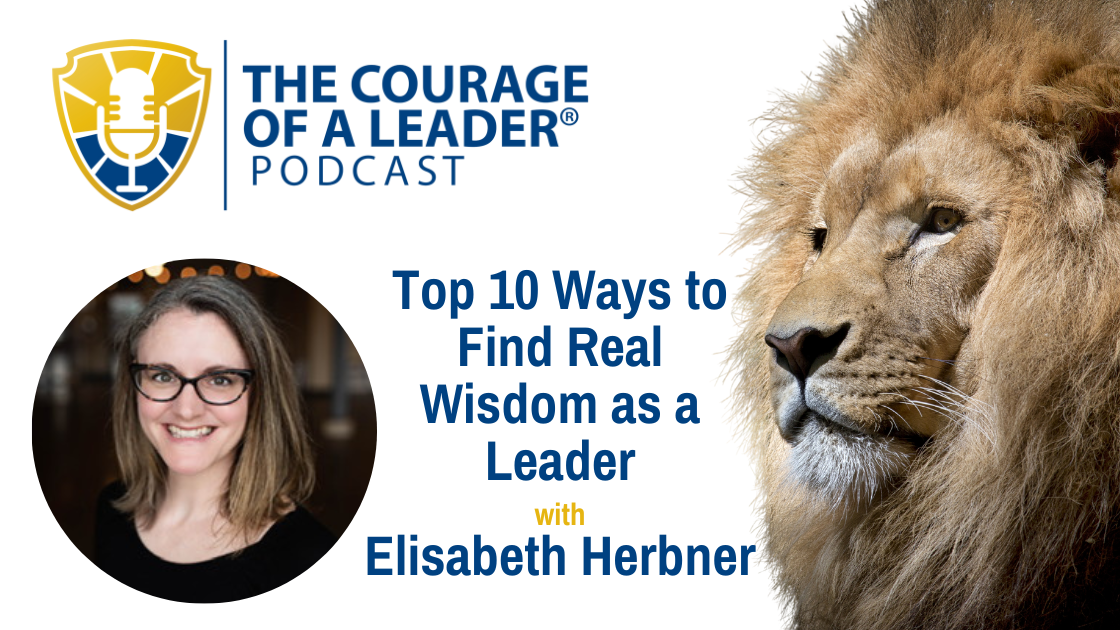
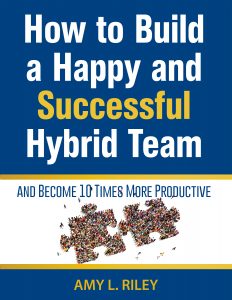
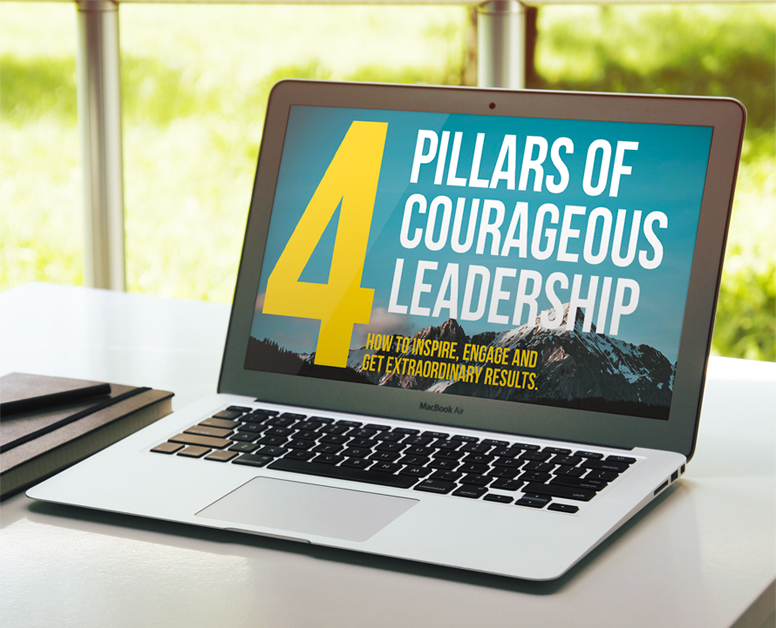 A Summary of The Courage of a Leader® 4 Pillars
A Summary of The Courage of a Leader® 4 Pillars